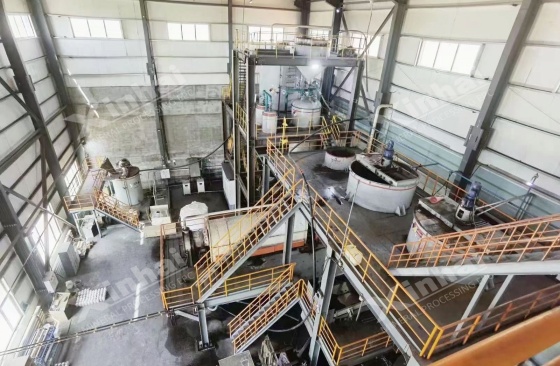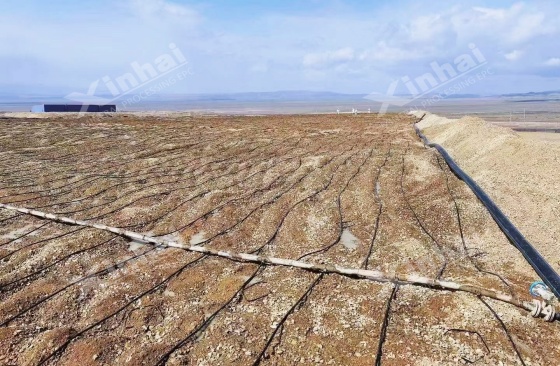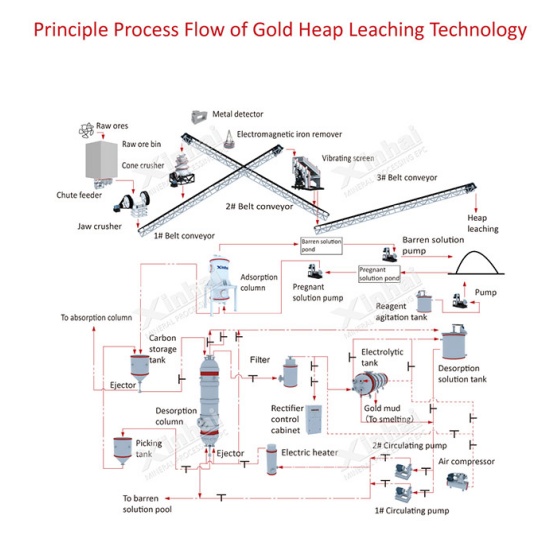
Leaching is a commonly used method for extracting gold from gold mines. Its working principle is to use solvents to contact ore and extract gold from the original ore through physical and chemical processes such as dissolution and diffusion.
VAT leaching and heap leaching are all commonly used methods for gold extraction from gold mines. This article introduces the core differences between the two and compares their costs and application scenarios.

1. VAT leaching process flow
First, the raw ore is crushed and ground to a particle size of several millimeters to several centimeters. The ground ore is placed in a leaching tank.
Then, a leaching agent is added to the leaching tank, and the appropriate leaching agent and dosage are selected according to the properties of the ore. The ore and the leaching agent are fully contacted by mechanical stirring or air stirring to promote chemical reaction.
Next, the temperature and pressure in the barrel are adjusted as needed to optimize the leaching conditions.
Finally, when the leaching reaction is completed, the gold-containing solution is collected and filtered to separate the undissolved residue.

2. VAT leaching advantages and disadvantages
Advantages: Higher leaching efficiency and higher gold recovery. Faster leaching time, less time required to process the ore. Also, since the operation is carried out in a barrel, it is easier to control temperature and pressure.
Disadvantages: Since VAT leaching requires investment in barrels and infrastructure, the investment cost is higher and it is not suitable for large-scale production.
3. VAT leaching application
It is suitable for medium-scale gold extraction operations and has more advantages when processing medium-grade gold ores.

1. Heap Leaching process flow
First, the low-grade gold ore is crushed to a certain particle size (30-50mm). The fine-grained ore powder after crushing can be agglomerated to improve permeability and increase the leaching rate.
Then, the crushed ore is piled on a leak-proof liner (HDPE) paved with materials such as asphalt, concrete or plastic.
Next, a solution such as low-concentration cyanide, alkaline solution, non-toxic solvent or dilute sulfuric acid is sprayed on the ore pile to dissolve the gold.
Finally, the gold-containing solution is filtered out from the ore pile and the gold is recovered by methods such as activated carbon adsorption or zinc powder replacement precipitation.
2. Heap Leaching advantages and disadvantages
Advantages: Low requirements on terrain conditions, can be adapted to local conditions. Suitable for large-scale production, can process a large amount of gold ore at the same time. Suitable for processing low-grade gold ore. Low investment.
Disadvantages: Long leaching time (3-18 months), slow capital return. Easily affected by climate, heavy rain will dilute the leaching solution, and low temperature will reduce the cyanidation reaction rate.
3. Heap Leaching application
It is often used to develop gold deposits with small ore bodies or low grade, or both, which cannot be developed and utilized by conventional methods.

| Factor | VAT Leaching | Heap Leaching |
|---|---|---|
| Cost | Medium | Low |
| Processing Time | Weeks | Months |
| Ore Type | Medium-grade | Low-grade |
| Best For | Small operations | Large-scale mines |
Choose VAT: if the ore has poor permeability and the budget is limited.
Choose Heap: if you are processing low-grade ore and need low cost.
The above introduces the process flow, advantages and disadvantages and application scenarios of the two leaching methods, VAT leaching and heap leaching. Xinhai Mining can provide customers with EPC+M+O services such as gold mine leaching process design, equipment installation, and beneficiation plant operation. As a mining company with 28 years of experience in the field of gold ore beneficiation, Xinhai has served mines in more than 100 countries and regions, with hundreds of gold mine project cases. If you have any needs in gold ore beneficiation, please contact us.
To find out more about our products and solutions, please fill out the form below and one of our experts will get back to you shortly.